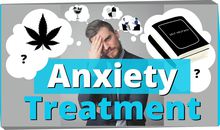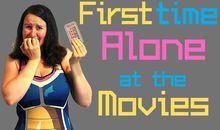Panic Test: Do I have Panic Disorder?
You may have heard the terms Panic, Panic attacks and Panic disorder.
And are wondering if you fall-under any of these categories.
To get you even more confused, let me just say that you can have ‘Panic Attacks’ and not ‘Panic’ or ‘Panic Disorder’, and you can suffer from ‘Panic’ while having ‘NO Panic Attacks’.
Now, let me clear things up a bit. And then I’ll run you through a panic screening test that you can tally-up and get a bit more of an idea as to whether you have issues with Panic.
First-off, 3 quick definitions for you.
Panic is the unhelpful thinking-style that is causing the anxiety.
Panic disorder is the diagnosis given when this thinking style and the avoidance that comes with it starts disrupting your life.
And Panic Attacks are sudden bursts of high anxiety, accompanied by one or more of the following symptoms:
palpitations, pounding heart, or increased heart rate. Sweating. Trembling or shaking.
Dry mouth. Difficulty breathing. Feeling of choking. Chest pain or discomfort.
Nausea or abdominal distress (churning in stomach).
Feeling dizzy, unsteady, faint, or light-headed.
Feelings that objects are unreal (like in a dream).
Fear of losing control, “going crazy,” or passing out.
Fear of dying. Hot flushes or cold chills.
Numbness, or tingling sensations.
Panic attacks develop suddenly and increase in intensity within about 10 minutes.
You can have Panic Attacks from other kinds of anxiety and it not be Panic Disorder.
It comes down to your primary fear:
The primary fear with Panic is of Anxiety. That you will lose control of yourself, lose relationships or your very life DUE TO anxiety.
With Social anxiety it’s a fear of loss of reputation, or ostracism from your community. Ending-up rejected and alone.
With Phobias it’s the fear of harm from whatever it is that the specific fear is focussed on.
With OCD it’s the fear that discomfort or a feeling of unrightness is signalling danger. And the idea that you won’t be able to cope with the intense regret and guilt you will feel later for not acting on this and preventing it.
Generalised anxiety involves fearing many different things, based on an unhelpful pattern of negative prediction called worrying.
Any of these types of anxiety can lead to having Panic Attacks if the level of anxiety gets high enough.
It’s only considered Panic Disorder if the unhelpful thinking style fits in the Panic camp:
Fear of anxiety causing you to embarrass yourself, lose control or die.
See because it’s fear about ANXIETY, you get caught in cycles of worrying about getting anxious again, which cause more and more anxiety.
This can escalate into the life-disrupting condition known as Panic Disorder.
And if it disrupts 2 or more areas of your life, it’s then considered Agoraphobia.
When it gets this bad, there are generally panic attacks popping up.
However, I’ve seen plenty of people who are caught in a panic cycle of fearing anxiety without it escalating up to the traditional symptoms known as a Panic Attack.
So keep that in mind when you are wondering if this is the label for you.
It’s all about the primary fear.
Figure that out and you’ll have a much better idea of what you’re dealing with.
Now, as promised, a quick test that you can fill-out to gain a better understanding of whether you may have Panic Disorder.
First, a quick disclaimer: this is intended to act as a guide.
Any diagnoses need to be done by a professional after a full assessment.
Ok, you’ll need to note down your scores to add them up at the end.
There’s just 13 questions, but you’ll still need to grab a piece of paper and a pen, or write it up on the device you’re using.
You’ll need to answer every question to get an accurate score.
Question number 1:
Keeping in mind the definition of Panic Attacks from earlier,
How frequently did you have panic attacks in the last week?
No panic attacks in the past week
1 panic attack in the past week
2-3 panic attacks in the past week
4-6 panic attacks in the past week
Or more than 6 panic attacks in the past week
Write-down 0 for No panic attacks, 1 for 1 panic attack, 2 for 2-3 panic attacks, 3 for 4-6 panic attacks, and 4 for more than 6.
Ok, question number 2:
How severe were the panic attacks in the last week?
0 - no panic attacks
1 - attacks were usually mild
2 - moderate
3 - severe
4 - extremely severe
Question 3:
How long did the panic attacks last?
0 - no panic attacks
1 - 1 to 10 minutes
2 - 10 to 60 minutes
3 - 1 to 2 hours
4 - over 2 hours
Question 4:
In the past week, did you avoid certain situations because you feared having a panic attack or a feeling of discomfort?
0 - no avoidance of situations
1 - infrequent avoidance of feared situations
2 - occasional avoidance
3 - frequent avoidance
4 - very frequent avoidance of feared situations
Question 5:
Write down any situations you avoided, or had panic attacks in, or experienced a feeling of discomfort when you were not accompanied. These might include:
Airplanes. Subways. Buses, trains. Ships. Theatres, cinemas. Supermarkets.
Standing in lines (queues). Auditoriums, stadiums. Parties, social gatherings. Crowds.
Restaurants. Museums. Elevators (lifts). Enclosed spaces (tunnels). Classrooms, lecture halls.
Driving or riding in a car. Large rooms (like lobbies). Walking on the street. Wide streets, courtyards.
High places. Crossing bridges. Travelling away from home. Or staying home alone.
Score yourself 0 if there aren’t any, 1 for 1 situation, 2 for 2-3 situations, 3 for 4-8 situations and score yourself 4 points if these are more than 8 situations.
Question 6:
Now rate how important these avoided situations were?
0 - unimportant (it doesn’t matter at all that you didn’t go)
1 - not very important
2 - moderately important
3 - very important
4 - extremely important
Question 7:
In the past week, did you suffer from the fear of having a panic attack (so, anticipatory anxiety or “fear of being afraid?”)
0 - no anticipatory anxiety
1 - infrequent fear of having a panic attack
2 - sometimes feared having a panic attack
3 - frequently feared having a panic attack
4 - feared having a panic attack all the time
Question 8:
How strong was this “fear of fear?”
0 – no fear
1 - mild
2 - moderate
3 - marked
4 - extreme
Question 9:
In the past week, did panic attacks or agoraphobia lead to an impairment in your family relationships (with your partner, or children, etc.)?
0 - no impairment
1 - mild impairment
2 - moderate impairment
3 - marked impairment
4 - extreme impairment
Question 10:
In the past week, did panic attacks or agoraphobia lead to an impairment of your social life and leisure activities (for example, you weren’t able to go to a film or party)?
0 - no impairment
1 - mild impairment
2 - moderate impairment
3 - marked impairment
4 - extreme impairment
Question 11:
In the past week, did panic attacks or agoraphobia lead to an impairment of your work or household responsibilities?
0 - no impairment
1 - mild impairment
2 - moderate impairment
3 - marked impairment
4 - extreme impairment
Question 12:
In the past week, did you worry about suffering harm from your panic attacks (for example, having a heart attack or fainting)?
0 - not true
1 - hardly true
2 - partly true
3 - mostly true
4 - definitely true
And lastly, Question 13:
Do you sometimes believe that your doctor was wrong when he told you your symptoms (like rapid heart rate, tingling sensations, or shortness of breath) have a psychological cause? Do you believe the actual cause of these symptoms is an undiscovered physical problem?
0 - not true (you do believe it’s psychological)
1 - hardly true
2 - partly true
3 - mostly true
4 - definitely true (you believe it’s definitely something wrong with your body)
Well done, you got all your answers down!
Now add up your numbers to get your total score.
If your score is between 0 and 8, then you’re probably not looking at Panic Disorder, or you’re in remission.
If your score is 9-18 then you may have mild Panic Disorder.
19-28 is moderate. 29-39 is severe.
And 40+ probably means you have very severe issues with Panic.
Again, a reminder that this is meant as a guide to give you a greater understanding of your difficulties.
For a diagnosis, you will need an assessment by a professional near you.
A big thanks to Psychology Tools .com who provided the Panic and Agoraphobia Scale.
If you want to fill-out the test online and have it score it-up for you, you can go to their website here.
I hope this has helped you glean greater insights into your anxiety.
If you are finding that Panic is your struggle, then hop on the waitlist for our Panic to Peace online course.
It’s not open often so we can manage the numbers, but you can sign-up to be the first one notified when it does.
If you're interested in our online Panic to Peace course click here.










